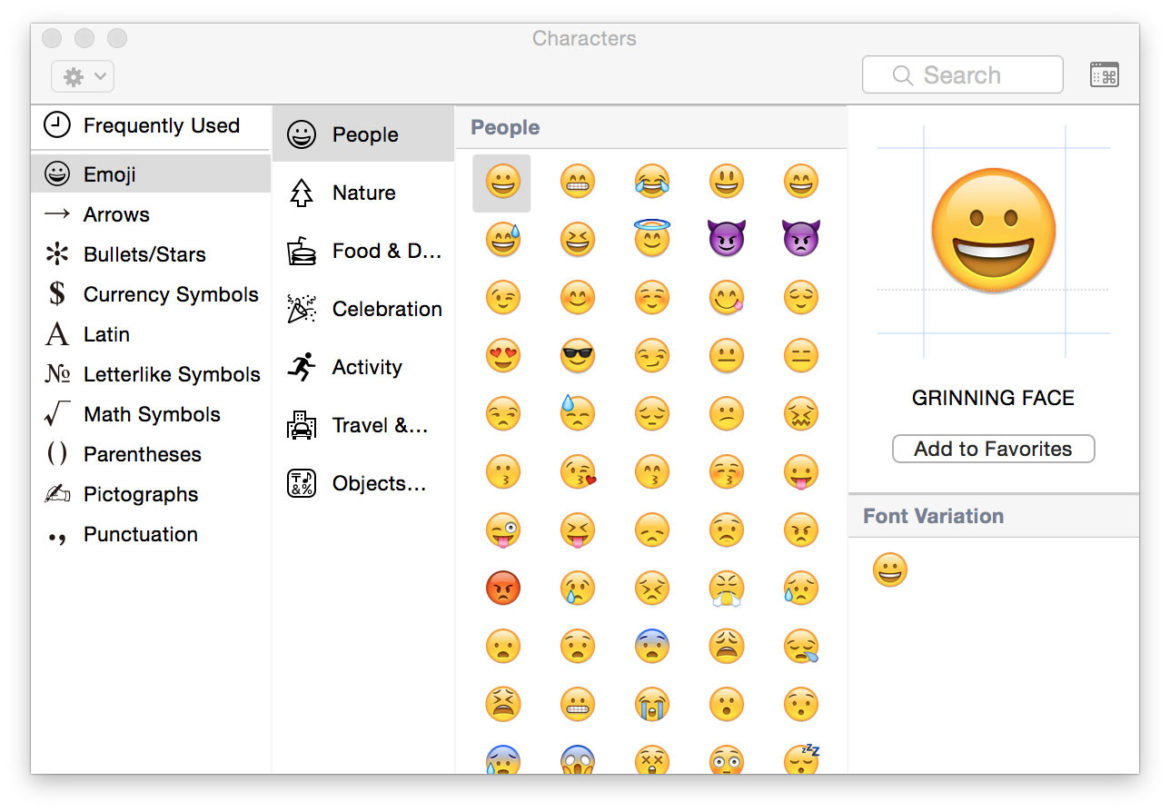
:max_bytes(150000):strip_icc()/GettyImages-618595354-f49c145c813d464ebeb15c0d04295add.jpg)
- EMOJIS ON MAC COMMAND HOW TO
- EMOJIS ON MAC COMMAND SOFTWARE
- EMOJIS ON MAC COMMAND CODE
- EMOJIS ON MAC COMMAND PASSWORD
Now the E&SV is working in Safari, and everywhere else. I closed up, went to my main user, opened Library/Preferences, found the files of the same name (4 plist and 1 plist.lockfile), moved them to my desktop and restarted the computer. When I opened E&SV everything loaded fine, after a little delay for the system to recreate the files. I dumped them on my desktop, and opened Safari.

I sorted by 'Date Modified' and found 4 files that had been changed at the time I was in E&SV. Closed everything and went into my user Library/Preferences. First I tested it in my 'alternate' user reality: I opened up Emoji & Symbol Viewer in my alternate Safari, selected a random emoji and added it to favorites. I thought of a trick today, however, and it worked. So, it had to be in my Preferences, but by the time I got that far - bored and disgusted.

Thanks to Linc Davis, I was also able to confirm that it worked fine in Safari if I set up another user. Post the results of Steps 1 and 2.įinally, a solution to the problem of Emoji & Symbol Viewer (aka E&SV) not showing up in Safari, even though it says it's Showing. If you’ve forgotten the password, you will need to reset it before you begin.Īfter testing, restart as usual (not in safe mode) and verify that you still have the problem.

EMOJIS ON MAC COMMAND PASSWORD
You must know your login password in order to log in. The login screen appears even if you usually log in automatically. The next normal startup may also be somewhat slow. Safe mode is much slower to start up and run than normal, with limited graphics performance, and some things won’t work at all, including sound output and Wi-Fi on certain models.
EMOJIS ON MAC COMMAND HOW TO
For more information on how to use symbols, emojis. You can copy&paste Smiley faces anywhere you like. Above mentioned procedure is not aplicable for MacOS.
EMOJIS ON MAC COMMAND CODE
type the Alt Code value of the Smiley face 1 on the numeric pad, release the Alt key and you got a White Smiley Face.
EMOJIS ON MAC COMMAND SOFTWARE
Note: If FileVault is enabled in OS X 10.9 or earlier, or if a firmware password is set, or if the startup volume is a software RAID, you can’t do this. How to type a Smiley face by using its Alt Code value. Start up in safe mode and log in to the account with the problem. Please take this step regardless of the results of Step 1.ĭisconnect all wired peripherals except those needed for the test, and remove all aftermarket expansion cards, if applicable. The purpose of this step is to determine whether the problem is caused by third-party system modifications that load automatically at startup or login, by a peripheral device, by a font conflict, or by corruption of the file system or of certain system caches. Create a new account in which to test, and delete it, including its home folder, after testing. The “Guest User” login created by “Find My Mac” is not the same. *Note: If you’ve activated “Find My Mac” or FileVault, then you can’t enable the Guest account. Any files you created in the guest account will be deleted automatically when you log out of it. Same problem?Īfter testing, log out of the guest account and, in your own account, disable it if you wish. If you need any passwords or other personal data in order to complete the test, memorize, print, or write them down before you begin. Don’t be alarmed by this behavior it’s normal. Applications will behave as if you were running them for the first time. While logged in as Guest, you won’t have access to any of your documents or settings. Don't use the Safari-only “Guest User” login created by “Find My Mac.” The purpose of this step is to determine whether the problem is localized to your user account.Įnable guest logins* and log in as Guest. Don’t be disappointed when you find that nothing has changed after you complete it. This procedure is a test, not a solution. Now you can select Show Emoji & Symbols which will display the below panel.Please read this whole message before doing anything. This will add an icon to the menu bar like below.


 0 kommentar(er)
0 kommentar(er)
